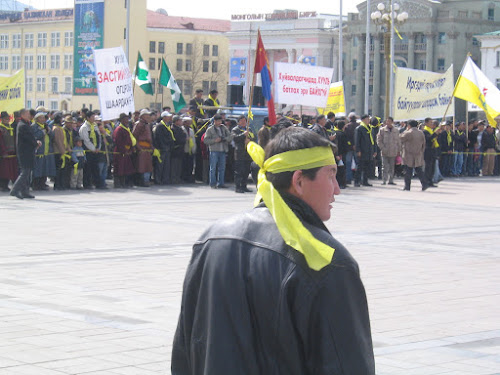Ulan Bator: Super lucky
Tags: Asia, Bike Expedition 2005, Cycling, Mongolia
"You are a very lucky man! Very lucky! Super-lucky!"
We are sitting in the car together with Kim, who is the owner and manager of UB Guesthouse in Ulan Bator, the capitol of Mongolia. Kim is a talkative South Korean who has been living in Mongolia for ten years. Just moments ago we were in a desperate state of searching around at the airport, and we had a great deal of luck to find one of our bags that was left behind (e.g. forgotten) when our plane arrived Ulan Bator earlier this morning.
Lost Luggage
According to Kim it's very rare to recover any baggage that has been left unattended on the airport.
-There are a lot of thieves in Ulan Bator, says Kim. You have to be very cautious. Wallets can disappear in few seconds. If you leave bags unattended, anyone can take it.
You don't know how lucky you are, says Kim. But we are perfectly aware of it, because the bag contained some very important and expensive equipment for this expedition, like our PC and satellite phone. If it weren’t for the assistance offered by Kim, who drove us back to the airport together with a friend who used to work as a security guard at the airport, we would never have been able to recover the bag. This would not have been feasible in a city were hardly no one speaks English, and our only way of communicating is by the use of Mongolia Phrasebook, which contains useful but rather limited words and expressions in Mongolian language.
Exhausted City
The situation at the airport had been taxing on all of us, but after a while we were ready to get familiar with the city. Our first impression of Ulan Bator is that it’s a very exhausted city. Most buildings are in a very bad state, and not sufficiently maintained. The cars are old and rusty. The roads have plenty of holes and bad tarmac. And what about the pedestrian area? Well, there is at least something to walk on at the side of the road, but certainly not satisfactory. But this is the common situation in less developed countries in Asia.
Anti Chinese Movement
Many Mongolians don’t like the behaviour of neighbouring China. One day when we are visiting the Suhbaatar Square where the parliament building is located, we stumble into a big demonstration that appears to be in opposition to the government’s pro-China policy. A street vendor tells us that the Chinese build huge factories in Mongolia that generates a lot of pollution and destroys the basis of living for the nomads. The demonstrators wear a yellow band, which interestingly reminds us of the Ukrainian demonstrators earlier this year.
Suddenly a television team from the government owned broadcasting channel approaches us. Do we know that many foreign embassies have warned theirs citizens against this movement? No, we reply and we get a sudden feeling of being a brick in the game of propaganda. In fact, how democratic is this regime?
Gobi Desert
No matter how important politics is for the people it concerns; we did not actually go to Mongolia to be too much worried about that. We are more worried about the Gobi-desert. And it seems to be very cold there at the moment. The temperature is not that low, rather it’s the wind that makes it cold. The powerful Siberian wind forces it’s ways into Gobi and all the way to Beijing, forming massive sandstorms wherever it reaches. You will know what we are talking about if you have been in Beijing during spring.
Secondly it will be a big challenge to get a sufficient amount of water to drink. Presently we don’t know exactly how many villages that are to be found in the desert, and how far it’s between them. Thus we have to carry water supplies for a minimum of two days (10 litres) consumption, when we are in doubt.
Gobi is in fact not a desert like Sahara. There are few sand dunes, and our route along the Transmongolian railway is mostly steppe.
We are well equipped, including wind stoppers, balaclava, gloves, shoe-covers and everything else that are essential during two weeks of biking in temperatures below zero degrees. We also have dry-food for two weeks consumption. Each bicycle will have 30kg of equipment and we are also sharing a bike cart, which is almost 30kg.
It’s time to leave. The desert is waiting……
Author: Eric Mortensen
